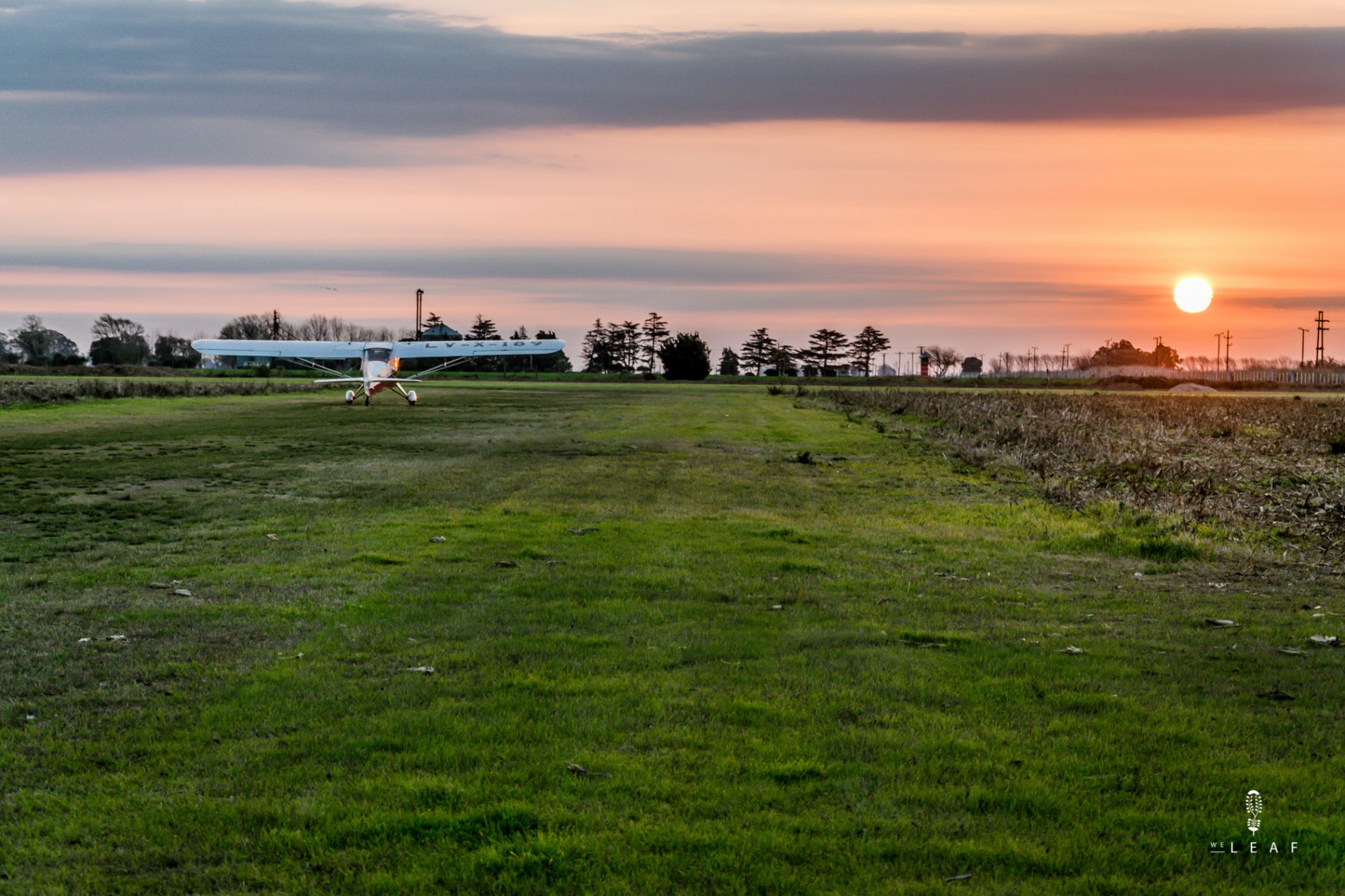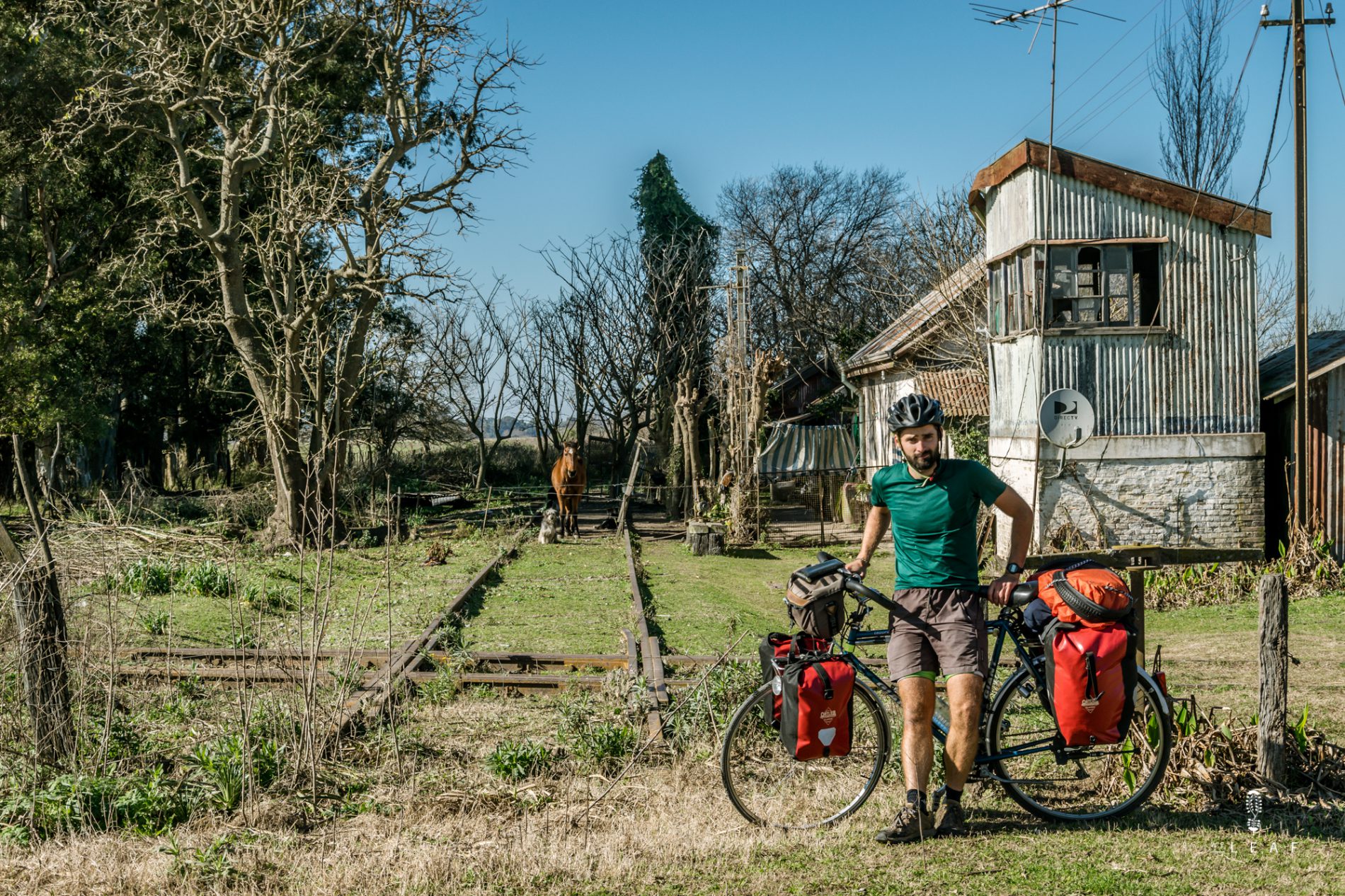
The old railway

A warm silence
July 30, 2017
Ruben Ferreira
August 25, 2017
21 july - Ferry
From the first moment our legs push us to Argentina. Off course with a detour due to the wind. Argentina is the country of landscapes, snow capped mountains and fresh rivers. It is the country where the gauchos guard the culture and the country of team sports and famous football names. It is the country on our bucket list.
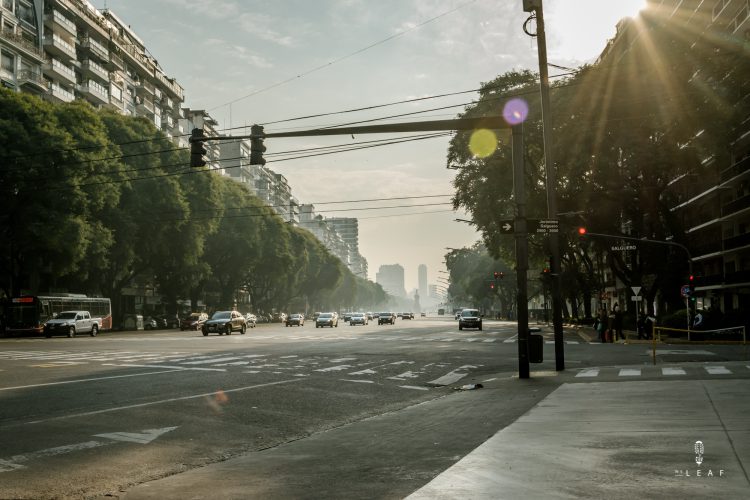
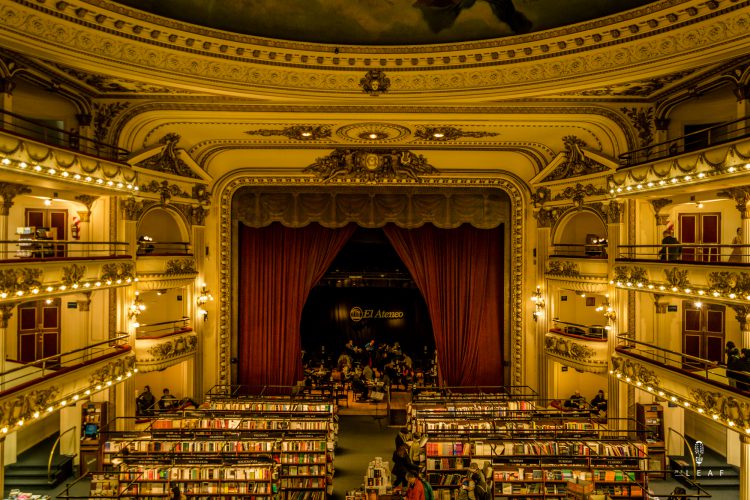
Impatiently we are waiting with our packed bicycles in between the cars on the ferry that brought us in one hour from Uruguay to Argentina. On of the drivers comes to have a chat and needs only a couple of words to ask if we have a place to sleep in Buenos Aires. We already have one for the first days, but decide to go to his place afterwards. Our first cycling kilometers in the big city feel like an organised welcome. Car windows open spontaneously to ask where we come from and wish us good luck. We feel welcome in Argentina.
On the sixteenth floor we share Federico's, our warmshower, first night in his brand new apartment. His mother is not delighted with the strangers in her son's house, and the first thing his cousins ask is what he earns with hosting us. Federico has received so much on his cycling trip in New Zealand that he wants to give something back. He cannot explain it to his family but as first experiment we can see the changes in the family's mind.
The same weekend we are invited to celebrate his mothers birthday with a real Argentinian asado. We visit Buenos Aires, meet with Margot, one of Zoë's friends, who studied half a year in Argentina and move on the a more classy neighbourhood outside the city center to the house of the driver.
Eduardo is a gentleman, well organised, planned and a little autoritair. It is no surprise that he became a colonel in the army and is now still teaching people in the university. He and his wife Iliria give us a new home and take their time to develop our Spanish to a level of proverbs. We discover Buenos Aires with a elaborated manual which sends us along all the highlights without walking one meter extra. We extend Zoë her passport in the Dutch embassy and visit a piano concert together. We stay ten days with Eduardo and Ili, which becomes a wonderful exchange of culture and values, enriching both of us.
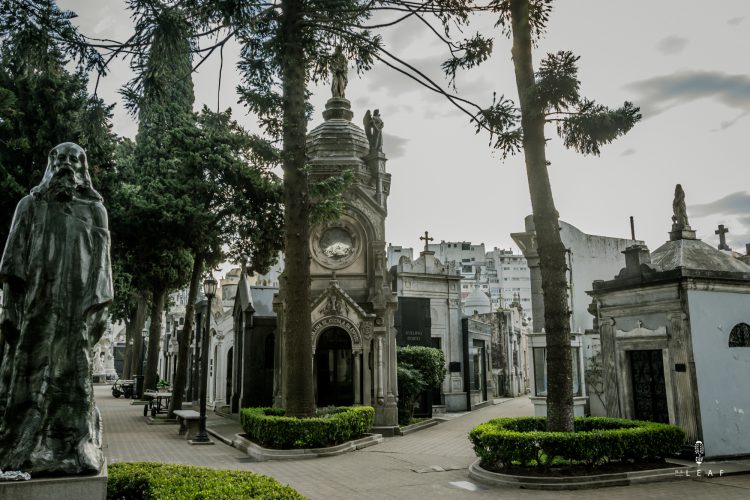
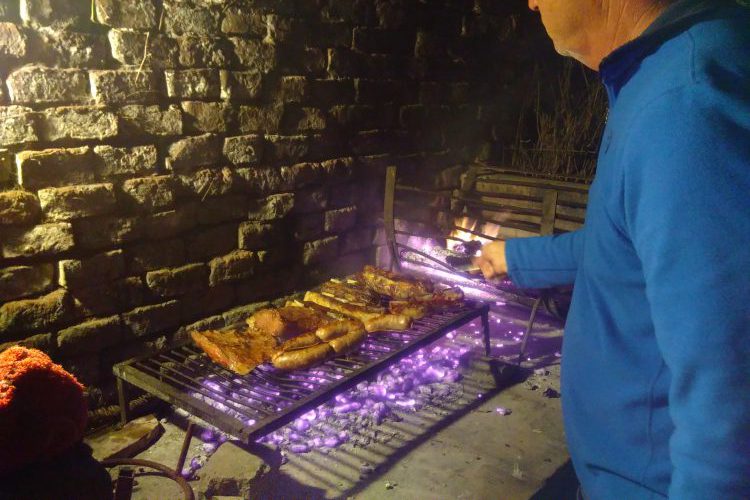
We have 1.200 to cycle to Mendoza, crossing the enormous pampas with the industrial agro-economy along endless strait roads like a railway. The idea sounds boring but we want to give it a try before simply taking a bus to the West. The railway is our guideline and takes along different old villages with English names. Names like 'Carlos Keen', 'Open Door' and 'Wheelwright' are the old names of the British railway engineers who came here to construct the railway network. All the villages look the same, and grew from the old railway station to the main square with a church and a bank. The railways are abandoned but we move like an invisible locomotive from the one village to another. The contacts in the villages are like wagons connected to the train and provide us a warm house every night.
The first day we still need to find the right track. We can't connect our wagon due to the muddy dirt roads. When we think that we are connected, the track goes into a dead end. At the end of the day we did only 50 kilometer when two, unpacked, cyclists come from the other side and offer us a place to sleep in their house. We have to cycle 10 kilometers back to the house, but their warm welcome is the first station on our track.
'We take off from the grass and circle on the wind over Island Verde.'
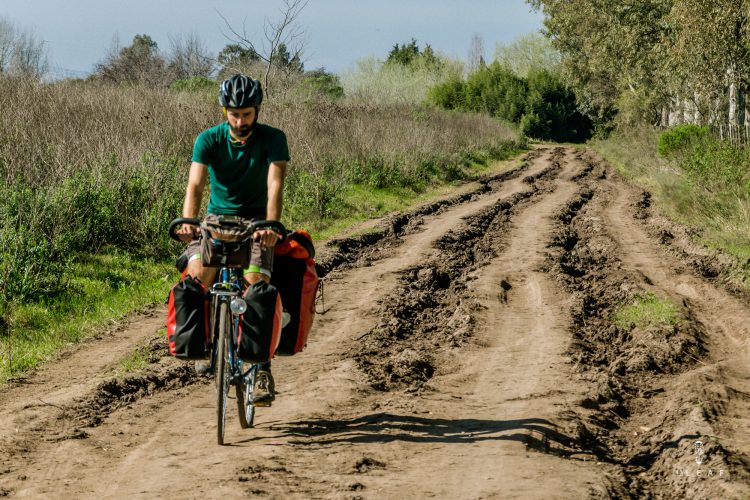
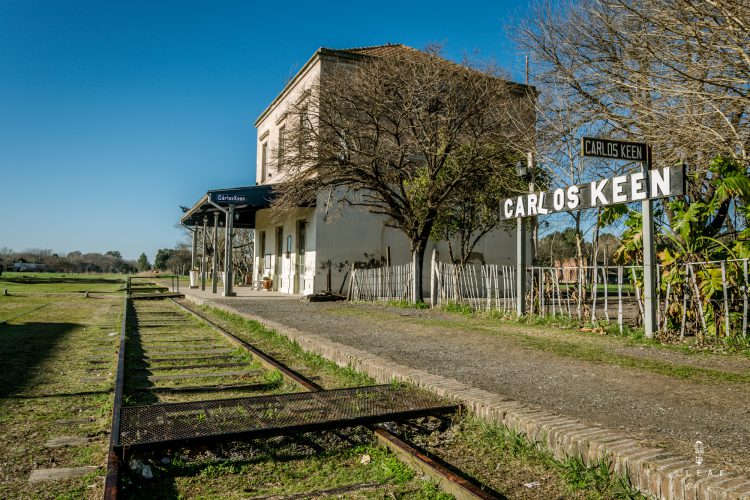
After this we have the right railway and make an average of 90 kilometers a day. We sleep at Lito's place, where we have a great time with his son Franco. Lito is extremely grateful for the contact with his son, who has a ..., that he subscribes himself on warmshowers to receive more international cyclists. We continue our route to Pablo who welcomes us in his family with delicious Argentinian food, introduces us to his friends as heroes and even arranges warm nights in the next villages. The next stop is with Moira and Martin, who are crazy to offer us their kingsize bed and sleep on the ground themselves on a one person mattress. All the families take us around in the car to show the main square and the city hall, which all look the same in every village. This local tour and habit even has a name. It is a, vuelta del perro, but without the dog and in the car because walking is a rare habit, and their isn't much more to do in town, like they say themselves.
Our locomotive heads on steady on the track, but uses a lot of energy. Everyday we have to battle with the wind from the front. One day the wind blasts 50 kilometers an hour right in our face when we struggle uphill on a dirt road with loose sand. Those are the hard moments. A voice appears in our head and the brain starts thinking. This is too heavy and extremely boring, why do we do this. Those words are silently in the air between us. We don't have to say them, because we both know that none of us wants to be weak, wants to give up or wants to cheat. It is a clear signal, but apparently our characters need it to suffer sometimes, to struggle with to pain which makes us stronger in the end. We keep our mouths shut and continue cycling until we arrive at Tatalo's place.
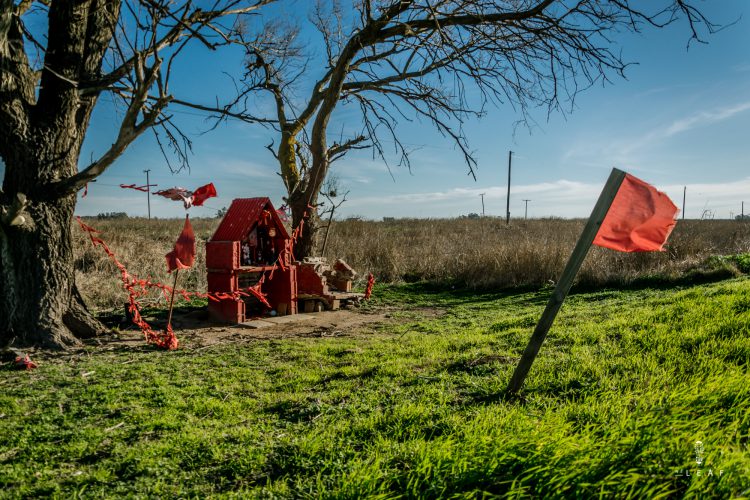

We meet Tatalo at a sanctuary for Gauchito Gil where we take some pictures when a women paints the little house and renews the red flags. The gaucho is a local saint and many people believe in him. Every five kilometer stands a little red sanctuary with some strange objects offered to him. Tatalo offers us his little house in the garden, hangar 1, when he sees our bicycles. If we want we can stay longer and go for a flight in a two person plane. The day after we can also go to an auction for premium cows, the well-known Angus beef, with Martin from the previous village. A challenge for our brain to make this difficult choice. Two cycling days or two days with local culture, unique experiences and some rest. Strangely, the choice isn't that easy. We feel weak to rest some much and fear to have enough time to reach Mendoza. Tatalo helps us a little bit by telling us that the next 150 kilometer are killing your brain and dangerous for cyclists.
The next day we open the doors from the hangar and push the vehicle outside. We feel like stars in a movie from the 60's when we get in the airplane. Our voices creak like on an old radio when we shout the commandos above the noise of the propeller. We take off from the grass and circle on the wind over Island Verde. One moment we take over the steering wheel and feel the adrenaline rising to the highest level. Back on the ground we can't stop smiling. To complete the movie we visit an oldtimer collection of Tatalo's friend and are invited to a Peña, a men's night with a delicious asado, originated from the folklore dancing.
With Martin we return to reality and learn everything about the cattle market nowadays. Martin works in a fidelot, where the cows are fed up in only six months for the meat industry In Argentina. The auction is a commercial event where pocket money doesn't count. Some of the best cows of Argentina, those who won prizes in the main event in Buenos Aires that we visited, are exposed outside. Their health and class is expressed in numbers. The big tent is full of people who all get a three course meal with some of Argentina's best meat. Satisfied the auction starts and big numbers are shouted in the room. Bulls, cows and even embryos are sold for ridiculous prices, all to produce the best Angus beef. The best cow is sold for about €15.000. We don't by anything but can win fifty doses of bull sperm, lucky bastards!
Finally we decide to take the bus to Rio Cuarto where the first mountains start. We steal two boring and dangerous cycling days by taking a bus. Why was this decision so difficult? We disconnect ourself from the train and say goodbye to the pampas.
[]
